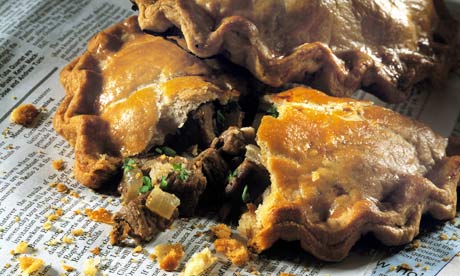
I keep thinking about Cornish pasties, which have just been given protected status by the European commission, and every time I do, I come over all Nigel Farage. I just don't understand it. What's the point of a system that gives a pasty cachet for being made in Cornwall rather than for the quality of its ingredients, or the skill with which it is made? Cornwall is replete with inferior factory-made pasties. Meanwhile, in Devon – and in Cumbria, Norfolk and Essex, too, for all I know – people are making perfectly delicious Cornish pasties which they are now forbidden to connect with the county where they were invented. As Nigel would say: "This is European bureaucracy gone mad!"
The EU Protected Food Names Scheme protects regional foods against imitation, and doles out, to those who meet the criteria, three different kinds of award: Protected Designation of Origin (PDO); Protected Geographical Indication (PGI); and Traditional Speciality Guaranteed (TSG). It is the second of these that the Cornish pasty received. Of course, on paper, legally protecting regional foods is a fine idea; it's another weapon in the battle against homogenisation. But of these three, only PDO protects foods whose characteristics are connected to the place in which they are produced (PDO is basically Euro-speak for terroir). The characteristics of Swaledale cheese, for instance, are dependent on local milk: in Swaledale, animals are pastured in herb-rich grassland, and this contributes to the fresh taste of the cheese. But PGI and TSG are pointless. I won't bore you with the details – read the commission's terms and conditions and lose the will to live – but, in essence, they're merely a means of distinguishing one product from another. Terroir has nothing to do with it.
I think the term PDO should stay, and the other two should go. That way, the award-winning pasty makers of Devon and elsewhere could continue to sell their delicious Cornish pasties – and we could still protect our regional foods. The question is: which ones? You can see why the smokehouses of Arbroath wanted to protect the reputation of their salty fish; Arbroath smokies are so famously delicious, there is serious cash to be made in passing off fakes as the real thing. But are Dittisham plums (Devon) and Cotherstone cheese (Co Durham) truly famous enough to require protection?
Oh, well. There is fun, and a certain amount of madness, to be had in coming up with a list. If you're strict about it, so very few things count. Take Yorkshire, county of my birth. Most of its greatest treats could be made anywhere: Yorkshire relish, curd tarts, parkin, Pontefract cakes, dandelion and burdock (the world's best dandelion and burdock is made by Mr Fitzpatrick's in Rawtenstall, Lancashire). Most of Yorkshire's cheeses are already protected. Do Ribston Pippin apples count? I don't know. Their history began in Ribston Hall, Knaresborough, 300 years ago, when Sir Henry Goodricke arrived from France with a pip, but now they are grown everywhere, and I have no idea whether a Ribston Pippin from Yorkshire tastes better than one from Surrey.
I became obsessed with my list but, even after hours of swotting, there were just two things on it: Evesham asparagus (increasingly rare, but still the best) and Morecambe Bay potted shrimps. In The Taste of Britain by Laura Mason and Catherine Brown (the best book about British regional food I know), I found a section on Orcadian razor clams, a delicacy known locally as "spoots". But since I have never visited Orkney, let alone tasted spoots, I felt it was cheating to add them.
The only way I could think of increasing the list was to include dishes made from "secret" recipes, on the grounds that, while such formulae have little to do with terroir, their classified nature means they cannot be replicated precisely. If the commission was to start protecting ancient recipes, you could include various sausages, and all sorts of sweet things: I would choose the Whitby lemon buns you can buy at Botham's of Whitby – though sadly it is already too late for the sweets I ate on holiday in Northumberland as a child. Cowe's, maker of Berwick Cockles, a soft-ish striped mint, shut up shop last year after 200 years in business. As Nigel Farage would no doubt say: "Another great British business sold down the river!" Poor Nigel. He wants it both ways, and I'm embarrassed to admit I know exactly how he feels.
rachel.cooke@observer.co.uk

